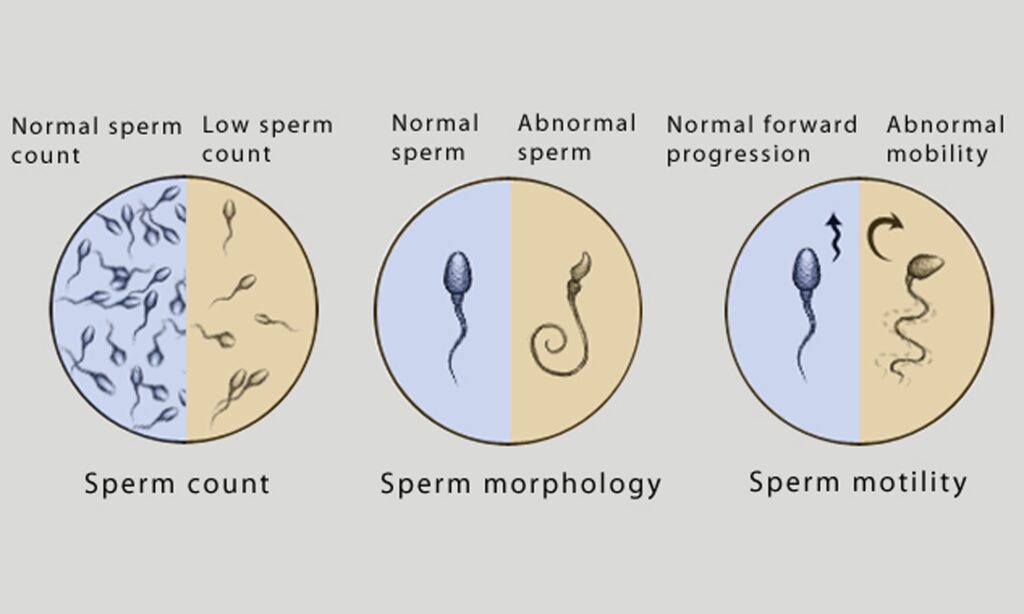Herbal Clinic sexologist

Low Sperm Count
Premature ejaculation (PE) means ‘coming too quickly’ is also known as early discharge or quick discharge, early fall, rapid ejaculation, rapid climax, premature climax, or early ejaculation) affects 25%-40% of the men.
Premature ejaculation occurs when a man ejaculates sooner during sexual intercourse than he or his partner would like. Premature ejaculation is a common sexual complaint. Estimates vary, but as many as 1 out of 3 men say they experience this problem at some time.
Symptoms
The main sign of low sperm count is the inability to conceive a child. There might be no other obvious signs or symptoms. In some men, an underlying problem such as an inherited chromosomal abnormality, a hormonal imbalance, dilated testicular veins or a condition that blocks the passage of sperm may cause signs and symptoms.
- Problems with sexual function — for example, low sex drive or difficulty maintaining an erection (erectile dysfunction)
- Pain, swelling or a lump in the testicle area
- Decreased facial or body hair or other signs of a chromosome or hormone abnormality
Causes
The production of sperm is a complex process and requires normal functioning of the testicles (testes) as well as the hypothalamus and pituitary glands — organs in your brain that produce hormones that trigger sperm production. Once sperm are produced in the testicles, delicate tubes transport them until they mix with semen and are ejaculated out of the penis. Problems with any of these systems can affect sperm production.
medical Causes
Low sperm count can be caused by a number of health issues and medical treatments. Some of these include:
- Varicocele. A varicocele (VAR-ih-koe-seel) is a swelling of the veins that drain the testicle. It’s the most common reversible cause of male infertility. Although the exact reason that varicoceles cause infertility is unknown, it might be related to abnormal testicular temperature regulation. Varicoceles result in reduced quality of the sperm. Infection. Some infections can interfere with sperm production or sperm health or can cause scarring that blocks the passage of sperm. These include inflammation of the epididymis (epididymitis) or testicles (orchitis) and some sexually transmitted infections, including gonorrhea or HIV. Although some infections can result in permanent testicular damage, most often sperm can still be retrieved. Ejaculation problems. Retrograde ejaculation occurs when semen enters the bladder during orgasm instead of emerging out of the tip of the penis. Various health conditions can cause retrograde ejaculation or lack of ejaculation, including diabetes, spinal injuries, and surgery of the bladder, prostate or urethra.
- Certain medications also might result in ejaculatory problems, such as blood pressure medications known as alpha blockers. Some ejaculatory problems can be reversed, while others are permanent. In most cases of permanent ejaculation problems, sperm can still be retrieved directly from the testicles.
- Antibodies that attack sperm. Anti-sperm antibodies are immune system cells that mistakenly identify sperm as harmful invaders and attempt to destroy them. Tumors. Cancers and nonmalignant tumors can affect the male reproductive organs directly, through the glands that release hormones related to reproduction, such as the pituitary gland, or through unknown causes. Surgery, radiation or chemotherapy to treat tumors also can affect male fertility. Undescended testicles. During fetal development one or both testicles sometimes fail to descend from the abdomen into the sac that normally contains the testicles (scrotum). Decreased fertility is more likely in men with this condition. Hormone imbalances. The hypothalamus, pituitary and testicles produce hormones that are necessary to create sperm. Alterations in these hormones, as well as from other systems such as the thyroid and adrenal gland, may impair sperm production. Defects of tubules that transport sperm. Many different tubes carry sperm. They can be blocked due to various causes, including inadvertent injury from surgery, prior infections, trauma or abnormal development, such as with cystic fibrosis or similar inherited conditions.
- Blockage can occur at any level, including within the testicle, in the tubes that drain the testicle, in the epididymis, in the vas deferens, near the ejaculatory ducts or in the urethra.
- Chromosome defects. Inherited disorders such as Klinefelter’s syndrome — in which a male is born with two X chromosomes and one Y chromosome instead of one X and one Y — cause abnormal development of the male reproductive organs. Other genetic syndromes associated with infertility include cystic fibrosis, Kallmann’s syndrome and Kartagener’s syndrome. Celiac disease. A digestive disorder caused by sensitivity to gluten, celiac disease can cause male infertility. Fertility may improve after adopting a gluten-free diet. Certain medications. Testosterone replacement therapy, long-term anabolic steroid use, cancer medications (chemotherapy), certain antifungal and antibiotic medications, some ulcer medications, and other medications can impair sperm production and decrease male fertility. Prior surgeries. Certain surgeries might prevent you from having sperm in your ejaculate, including vasectomy, inguinal hernia repairs, scrotal or testicular surgeries, prostate surgeries, and large abdominal surgeries performed for testicular and rectal cancers, among others. In most cases, surgery can be performed to either reverse these blockages or to retrieve sperm directly from the epididymis and testicles.
Enviromental causes
Sperm production or function can be affected by overexposure to certain environmental elements, including:
- Industrial chemicals. Extended exposure to benzenes, toluene, xylene, herbicides, pesticides, organic solvents, painting materials and lead might contribute to low sperm counts.
- Heavy metal exposure. Exposure to lead or other heavy metals also can cause infertility.
- Radiation or X-rays. Exposure to radiation can reduce sperm production. It can take several years for sperm production to return to normal. With high doses of radiation, sperm production can be permanently reduced.
- Overheating the testicles. Elevated temperatures impair sperm production and function. Although studies are limited and are inconclusive, frequent use of saunas or hot tubs might temporarily impair sperm count.
- Sitting for long periods, wearing tight clothing or working on a laptop computer for long stretches of time also might increase the temperature in your scrotum and slightly reduce sperm production.
Risk Factors
A number of risk factors are linked to low sperm count and other problems that can cause low sperm count. They include:
- Smoking tobacco
- Drinking alcohol
- Using certain illicit drugs
- Being overweight
- Being severely depressed or stressed
- Having certain past or present infections
- Being exposed to toxins
- Overheating the testicles
- Having experienced trauma to the testicles
- Being born with a fertility disorder or having a blood relative, such as your brother or father, with a fertility disorder
- Having certain medical conditions, including tumors and chronic illnesses
- Undergoing cancer treatments, such as radiation
- Taking certain medications
- Having a prior vasectomy or major abdominal or pelvic surgery
- Having a history of undescended testicles
Prevention
To protect your fertility, avoid known factors that can affect sperm count and quality. For example:
- Don’t smoke.
- Limit or abstain from alcohol.
- Steer clear of illicit drugs.
- Talk to your doctor about medications that can affect sperm count.
- Maintain a healthy weight.
- Avoid heat.
- Manage stress.
- Avoid exposure to pesticides, heavy metals and other toxins.
F.A.Q
Doctors specialized in Urologist or sexologist both can treat Erectile dysfunction. You can ask your healthcare provider, family or friends for recommendations for the best doctor for ED in your local area.
Erectile dysfunction has a lot of latest treatment options like Penile pumps, Testosterone replacement therapy, etc….. These treatments are treated based on the root cause of it.
There is no specific treatment for erectile dysfunction that is best. Specialized sexologist or urologist will identify the root cause of erectile dysfunction and provide the best treatment that suits you.
You need to identify the Specialization of a doctor. If they are specialized like urologist, sexologist or endocrinologist you can consult with them for Erectile dysfunction treatment in Bangalore.



